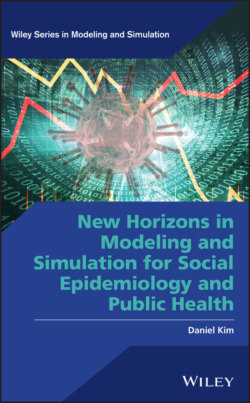Читать книгу New Horizons in Modeling and Simulation for Social Epidemiology and Public Health - Daniel Kim - Страница 23
2.1 Advantages of Systems Science Approaches over Conventional Approaches
ОглавлениеThe real world is made up of a series of complex systems. As we have seen in Chapter 1, health and disease are products of causal factors operating through multiple pathways at multiple levels. Such complex systems are not simply linear—they are characterized by causal feedback loops and complex interactions between actors at multiple levels and are inherently dynamic. Traditional multivariable models adopt a more reductionist approach and lack the ability to capture such features. In general, they implement static or discretely longitudinal analyses, do not incorporate potential nonlinearities such as feedback loops, and do not capture behavioral responses of individuals (Luke and Stamatakis 2012). By contrast, systems science approaches were explicitly developed to account for such features.
Although variation in the relationship between exposures and outcomes that is “exogenous” or “as if random” is the primary objective of advanced methods used to strengthen causal inference, the real world is filled with endogeneity. Endogenous factors are those found within the same system, meaning that they may bias the association between an exposure and an outcome. Notably, systems science approaches do not regard the endogeneity of the real world as nuisances; rather, through a more holistic approach, they model the presence of such complex pathways and mechanisms to better understand them (Luke and Stamatakis 2012).
Systems science approaches represent innovative sets of tools that can model and simulate the real world with enough complexity to be useful. Yet importantly, like their traditional model cousins, they reflect simplified versions of reality. Ideally, systems models retain enough of the salient characteristics of complexity to enhance our understanding of the problem under study, without being so complex themselves that they are opaque and as impenetrable to our understanding as reality itself. Moreover, systems science approaches enable virtual conduct of experiments that are often not feasible, whether due to cost, ethical reasons, or the simple fact that there is no way to explore the impact of an intervention (e.g. policy) and also go back in time and intervene differently to compare outcomes. With simulation models, it is straightforward to compare a wide array of hypothetical scenarios in silico. For further exposition of the virtues of modeling, see Epstein (2008) and Mabry et al. (2010).
